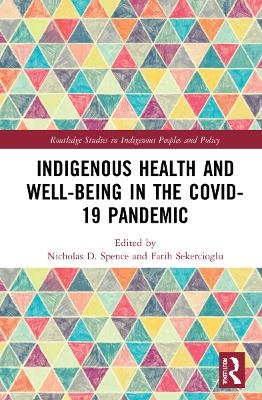
Indigenous Health and Well-Being in the COVID-19 Pandemic
Routledge (Verlag)
978-1-032-11543-6 (ISBN)
This book investigates the impact of the COVID-19 pandemic on the health and well-being of Indigenous Peoples and assesses the policy responses taken by governments and Indigenous communities across the world.
Bringing together innovative research and policy insights from a range of disciplines, this book investigates the impact of the COVID-19 pandemic on the health and well-being of Indigenous Peoples across the world, with coverage of North America, Central America, Africa, and Oceania. Further, it explores the actions taken by governments and Indigenous communities in addressing the challenges posed by this public health crisis. The book emphasises the social determinants of health and well-being, reflecting on issues such as self-governance, human rights law, housing, socioeconomic conditions, access to health care, culture, environmental deprivation, and resource extraction. Chapters also highlight the resilience and agency of Indigenous Peoples in combating the COVID-19 pandemic, despite the legacy of colonialism, patterns of systemic discrimination, and social exclusion.
Providing concrete pathways for improving the conditions of Indigenous Peoples in the wake of the COVID-19 pandemic, this book is essential reading for researchers across indigenous studies, public health, and social policy.
Nicholas D. Spence is Assistant Professor in the Department of Sociology and Department of Health and Society, University of Toronto, Canada. Fatih Sekercioglu is Assistant Professor in the School of Occupational and Public Health, Toronto Metropolitan University, Canada.
Introduction, by Fatih Sekercioglu and Nicholas D. Spence Chapter 1. COVID-19 and Indigenous Peoples’ right to health, by Agnieszka Szpak Chapter 2. Pandemic Precedent: Indigenous Demise in the Wake of Columbus, by W. George Lovell Chapter 3. COVID-19 among Indigenous populations in Mexico and the response of the health system, by Sergio Meneses-Navarro, Graciela Freyermuth-Enciso, Blanca Pelcastre-Villafuerte, Liliana Gómez-Flores-Ramos Chapter 4. An Australian First Nations COVID-19 Prevention Strategy and the limits of a Medicalised Managerial Discourse, by Philip Morrissey Chapter 5. Pandemic Policy, First Nations and the Power of Self Determination by Thalia Anthony and Lydia McGrady Chapter 6. Indigenous Health Systems and the Management of Infectious Diseases: A Study of the Emergence of the COVID-19 Pandemic among the Igbo of Southeast Nigeria, by Samuel O. Okafor, Bartholomew U. Nwokoma, Obidebube Emerem Jennifer, and Bonaventure Nwokeoma Chapter 7. The Coronavirus Pandemic in Ibadan, Nigeria: Existentialities, State Responses, and Outcomes, by Ọláyínká Àkànle, Demilade Kayode, EwaJesu Opeyemi Okewumi, Irenitemi Abolade, and Olayinka Ola-Lawson Chapter 8. Clearing the Fog for Informed Policy Decision-Making During the COVID-19 Pandemic in Canada, by Nicholas D. Spence, Vivian Chau, Maryam S. Farvid, Jerry P. White, (James) Paranthaman Rasalingam, and Lawrence C. Loh Chapter 9. Clinical, social and environmental risk factors: their role in the disproportionate burden of COVID-19 in Indigenous populations, by Élyse Caron-Beaudoin, and Ghazal Fazli Chapter 10. Threats, challenges, and adaptation: The experience of the subarctic Cree Peoples of western James Bay, Canada, during the SARS-CoV-2 (COVID-19) pandemic, by Robert J. Moriarity, Meaghan J. Wilton, Aleksandra M. Zuk, Leonard J.S. Tsuji, Greg Sutherland Jr., Nicholas D. Spence, Andrew Solomon, Miranda Shou, Atanu Sarkar, Gabby Resch, Jason Nolan, Ali Mazalek , Jim D. Karagatzides, David S Di, Nadia Charania, Heidi Y. W. Chan, Christian Boisvert-Huneault, and Eric N Liberda Chapter 11. Pandemic Pipelines: How Essential Service Declarations Enabled Extractive Infrastructure Development under the Cover of COVID-19, by Tyler McCreary and Shauna Wouters
| Erscheinungsdatum | 17.08.2022 |
|---|---|
| Reihe/Serie | Routledge Studies in Indigenous Peoples and Policy |
| Zusatzinfo | 12 Tables, black and white; 11 Line drawings, black and white; 6 Halftones, black and white; 17 Illustrations, black and white |
| Verlagsort | London |
| Sprache | englisch |
| Maße | 156 x 234 mm |
| Gewicht | 498 g |
| Themenwelt | Medizin / Pharmazie ► Medizinische Fachgebiete ► Psychiatrie / Psychotherapie |
| Sozialwissenschaften ► Pädagogik ► Sozialpädagogik | |
| Sozialwissenschaften ► Soziologie ► Spezielle Soziologien | |
| ISBN-10 | 1-032-11543-2 / 1032115432 |
| ISBN-13 | 978-1-032-11543-6 / 9781032115436 |
| Zustand | Neuware |
| Haben Sie eine Frage zum Produkt? |
aus dem Bereich


